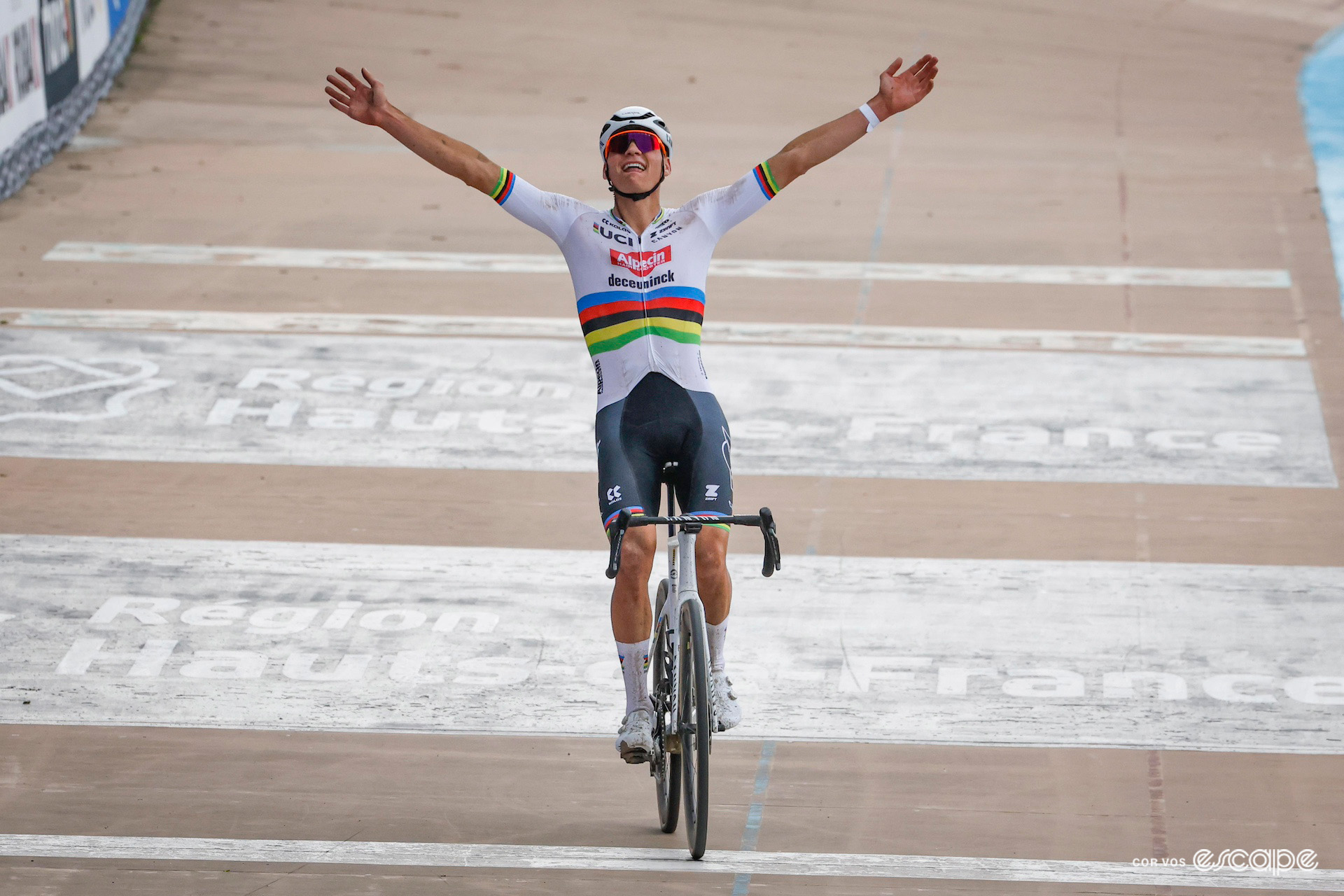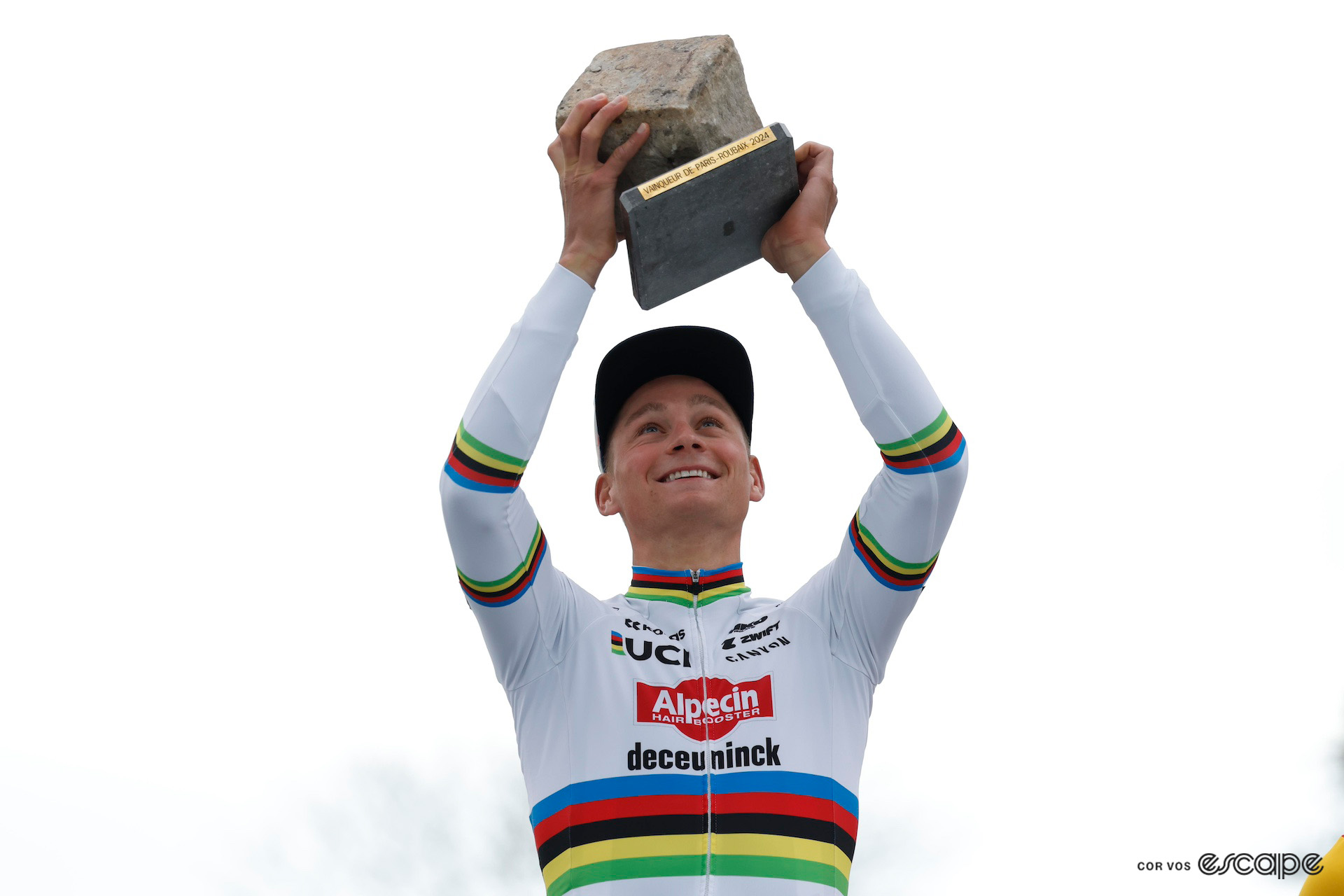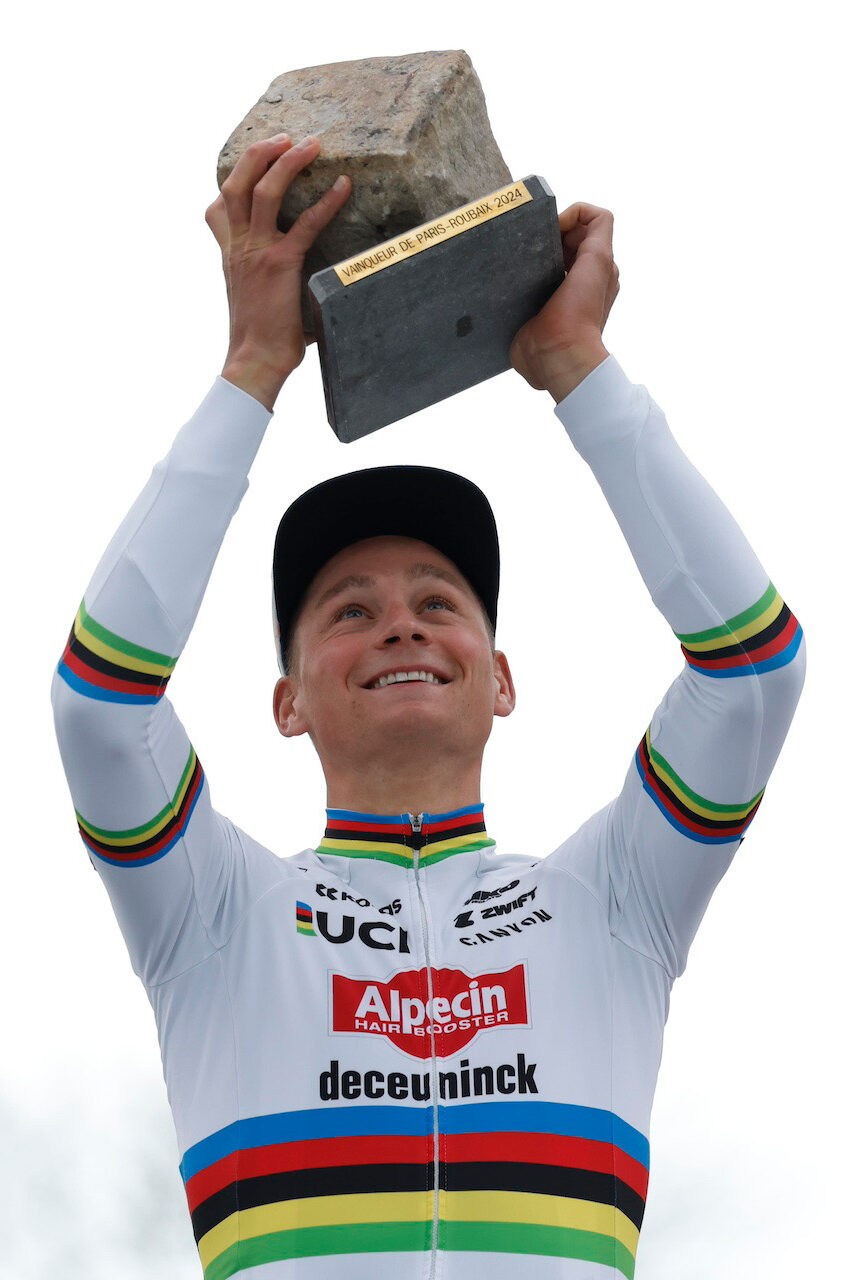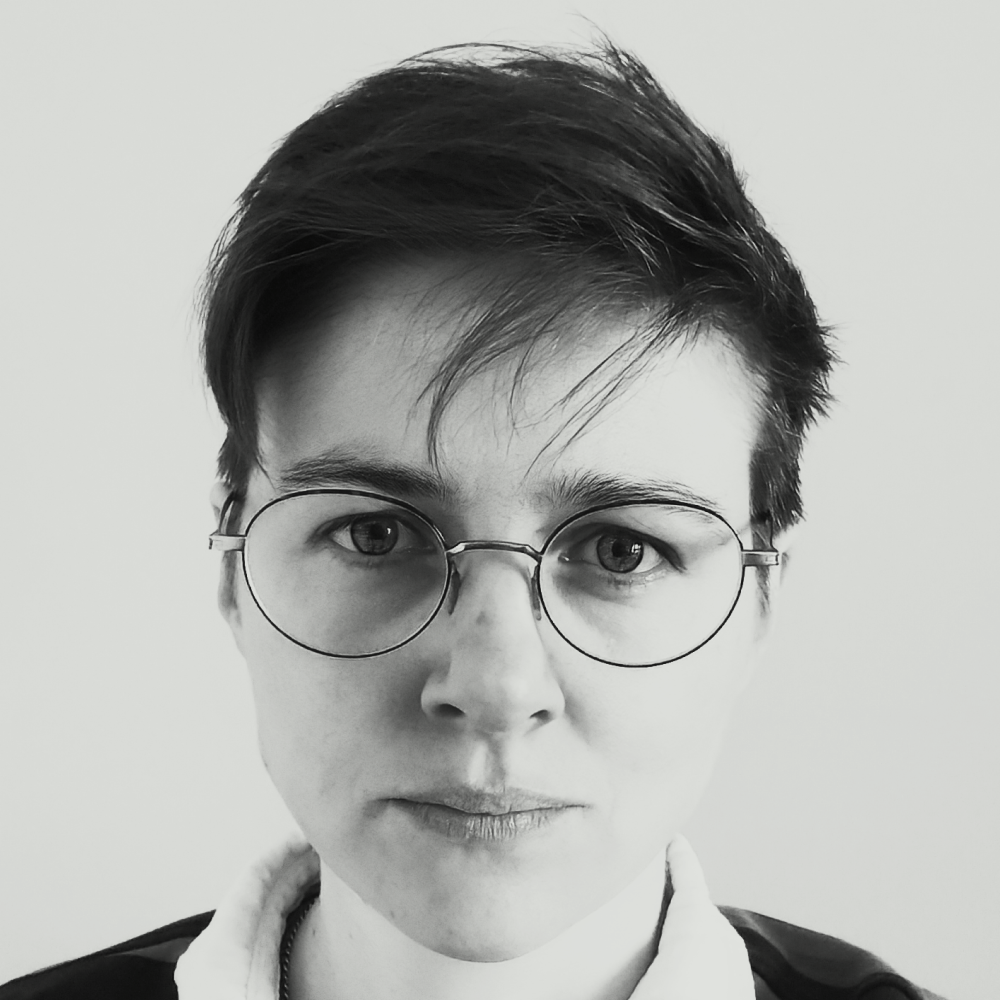Five race days, three victories, one assist and two Monuments – one man: Mathieu van der Poel.
He was the outright favourite, several strata above his rivals one week after winning his third Tour of Flanders, and with the help of an imperious Alpecin-Deceuninck team, the world champion seemed near untouchable at Paris-Roubaix (Hommes). After attacking almost 60 km from the Roubaix velodrome, Van der Poel raised his arms to celebrate back-to-back victories at the Hell of the North with a commanding advantage over those resigned to racing for second.
- A nine-rider breakaway was established earlier than expected, but the same could be said for the eventual catch that happened before even the halfway point, thanks to the fierce drive led predominantly by the team of defending champion Van der Poel, which also saw a decisive split of the peloton.
- What was left of the peloton – about 30 riders – swept up the remains of the breakaway just outside 140 km to go, and the pace remained high, the group stretched in one long line with two major obstacles close at hand, the crucial Haveluy à Wallers and Trouée d’Arenberg sectors. Lidl-Trek took over control on the four-star prelude to the Arenberg Forest, guiding Mads Pedersen onto the pointy end in advance of the controversial chicane.
- The threatening switch back and forth was fairly uneventful in the end, perhaps thanks to the small number of riders left in contention. Pedersen led the way onto the cobbles, setting an infernal pace with Mick van Dijke closely marking him – he and his twin brother Tim, who punctured on the Trouée d’Arenberg, were the only Visma-Lease a Bike riders left at the front, their team leader Christophe Laporte stuck in a forlorn chase after himself suffering a badly timed mechanical. What’s more, the team’s bad luck had struck another blow before the start with 2022 winner Dylan van Baarle ruled out through illness. In the end, the 24-year-old twins did an admirable job in place of their senior colleagues, 16th for Tim and 19th for Mick.
- Van der Poel first put the hammer down on the Arenberg cobbles, quickly finding a small gap. He was joined by his teammate Philipsen, along with Pedersen and Mick van Dijke once back on the road, and their number swelled again a few kilometres later.
- After a flurry of excitement between sectors, Stefan Küng and Nils Politt slipped off the front 87 km from the finish, but with Alpecin-Deceuninck’s Gianni Vermeersch marking and a sturdy chase behind, their adventure didn’t last.
- The trio was caught after just under 20 kilometres in the clear, rejoining a group of about 30 riders. The attacks continued for a number of kilometres, the UAE Team Emirates pair of Politt and Tim Wellens particularly busy with Vermeersch also toying with the bunch, but there was then a brief lull in the action before the Orchies sector.
- Orchies, weighing in at 1,700 metres and earning three stars, came almost exactly 200 kilometres into the race, and it was here that Van der Poel made his move. His teammate was setting the pace on the front at the time with the world champion in fourth wheel, and when he went, none could follow.
- Pedersen had sensibly positioned himself on Vermeersch’s wheel, but still, he could not match the world champion when he launched his attack. The group’s disadvantage went from a handful of seconds to terminal in no time at all.
- Van der Poel’s lead tipped over a minute by the 50km-to-go mark and nudged three minutes by the last 10 km; while he reached out for a second-consecutive victory, the chasers resigned themselves to a race for second. Pedersen, Politt and the Groupama-FDJ pair of Küng and young phenom Laurence Pithie were strongest and most alert, but they could not shake off the ominous – and super-fast – Philipsen.
- By 10 km to go, Pithie had crashed out of the group and Philipsen had shaken off Küng leaving three to fight over the last remaining steps of the podium. Once in the velodrome, Politt accelerated first in the hope of taking the superior sprinters by surprise, but he was overcome by both. In the end, Philipsen was able to double up for Alpecin-Deceuninck with Pedersen coming home third, the first Dane to finish on the Paris-Roubaix podium in almost 130 years.
- Van der Poel’s margin of victory was a huge three minutes flat, and the time limit was 5:52:03, or just +26.05 over his time. Of those who made it to the velodrome, 18 would be told they finished outside the time limit (OTL), Jayco-AlUla’s Kelland O’Brien earning the dubious honour (far from dubious at this race) of being the last to earn a placing on the results sheet having come home 110th, 25:53 after the world champion (135 finished in time last year, with three OTL). His compatriot Cyrus Monk (Q36.5) was the last to arrive at the finish, but with a 48:18 deficit.
- For what seems like the nth time we’ve said this about bike races of late, this year’s Paris-Roubaix is the fastest ever, beating the previous fastest recorded just last year. That Van der Poel fella is quick.

Brief results:
Loading...
Quote of the day:
“It’s hard to believe, actually. Again, with the team, maybe even stronger than last year. I’m super proud of the boys and very happy to finish it off.”
Mathieu van der Poel on winning Paris-Roubaix
Brief analysis:
- It should come as no surprise that Alpecin-Deceuninck were on it at arguably the biggest one-day race of the year, but their dominance was levels above even their hottest rivals at Paris-Roubaix. It’s perhaps due to the good fortune they’ve enjoyed compared to the likes of Visma-Lease a Bike and Lidl-Trek, not to mention the presence of two 2024 Monument winners in Philipsen and Van der Poel, that their confidence was palpable, and throughout the squad. After plenty of had work early on, Gianni Vermeersch joined his team’s co-leaders in the closing phases, helping to beat their rivals into submission by making probing attacks and/or marking others.
- For instance, when Stefan Küng and Nils Politt reached out with an early attack, Vermeersch glued himself to the wheel, and later, when the world champion made his winning move, there was a teammate on the front of the group to hold up potential pursuers. And for Philipsen then to attack his fellow chasers once the gap was unclosable, that showed ultimate confidence – the Milan-Sanremo winner ultimately made it a double-decker back-to-back result for Alpecin-Deceuninck with a runner-up finish behind Van der Poel for the second year in a row.
- The fastest edition for the second year in a row? This has ceased to be a surprising statement in recent seasons, and thankfully, we’ve gone beyond the counter-argument regarding the super-fast doping era. While few are naive enough to refute the continued existence of dodgy practices within pro cycling, it’s also true that other factors are contributing to the rising speeds we see year after year, through technology (obvs), but also a better understanding of physiology through nutrition, sleep, psychological wellbeing, etc. Then there’s the day-to-day factors outside of human control, like the conditions around a race. At this weekend’s Paris-Roubaix, for instance, it was pretty dry but for some lying water and mud following rain earlier in the week, which makes it faster, obviously. What’s more, it was blowing a hoolie (a good Scottish phrase that means it was jolly windy), mostly of the tail/cross variety, which naturally makes for a very high pace. Add some genuinely ferocious Classics squads into the mix, and you’ve got all the ingredients for a record-breaking race.
What did you think of this story?


